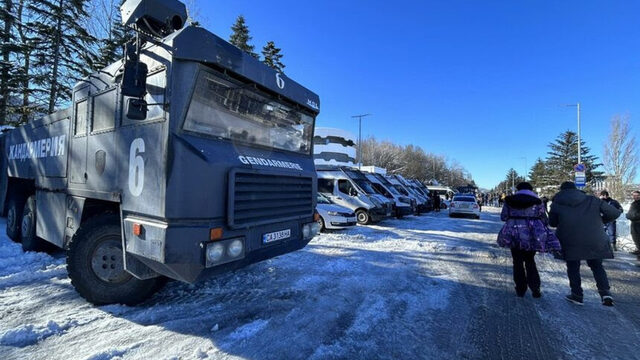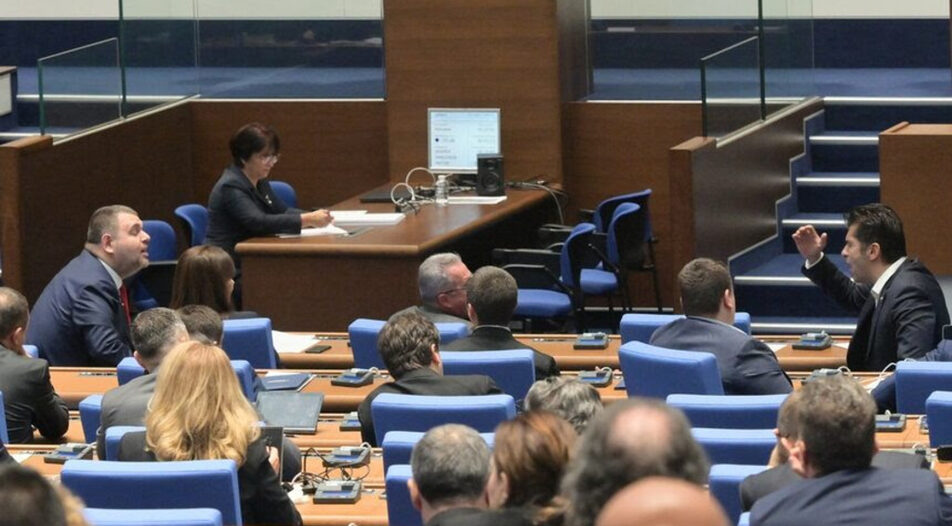The appointment of a deputy-governor of the National Health Insurance Fund is not usually the stuff that brings down governments. It's not, after all, a ministerial position, or even the top position in an institution.
And yet it just might do so. The ruling parties WCC-DB finally drew a line in the sand and let their silent non-coalition partners GERB and MRF know they want them to withdraw the candidacy of Prof. Momchil Mavrov. Mavrov was loudly opposed by WCC-DB on grounds of supposed corruption and a secret report by the counterintelligence suggesting Mavrov is unfit for the position. Yet he was pushed through Parliament with the help of the smaller two parties Vazhrazdane and TISP
It was the first time in a while that the leader of WCC Kiril Petkov and the new leader of MRF Delyan Peevski shouted at each other during the Parliamentary hearing. People close to them said it was not a pleasant conversation and was replete with words not fit for the pub, let alone Parliament.
So why is it that our ruling "assemblage" which screeched its way through protests and anti-Russian energy deals, suddenly got stuck on one man?
Well I'd like to think it is because Petkov and his crew finally saw the State in the way Peevski and Borissov see it. You see, regular citizens tend to think of the State as a top-down hierarchy. You've got a prime-minister, he's got a cabinet, the ministers have ministries, etc.
That's the wrong way of thinking about it, if you're a power-broker.
The state is actually more like a dispersed network of cash reservoirs, connected with leaking pipelines, and with keepers on most of them. In theory, it's all supposed to be working in sync. In practice, if you know the keeper, you can get some of the cash from a reservoir. And if you know the guards, you can drain away as many reservoirs as you want.
Ministers aren't worth much. It's the keepers of the reservoirs that matter - the places through which large amounts of money filter. And the guards - the regulators and the prosecution.
Mavrov would be a keeper. The National Health Fund distributes billions of levs each year to hospitals and pharma companies and the executive positions are the key to those funds. Same with state hospitals, road & agriculture funds, EU programs, and large municipalities - all of those are reservoirs and are seen as such by GERB and MRF.
I am pretty sure Peevski & Borisov have a map of all the large reservoirs and the people who guard them. And the regulators are up for nominations next.
So that was a bitter pill for WCC-DB to swallow. So there are only two options left. They either force GERB to step back or resign, or move ahead and pretend nothing happened. The fork is in the road.
This newsletter is helped by
Martin Dimitrov& Monika Varbanova
1. Politics this week:
The government is not toppled, this time Rumor has it, Denkov was supposed to speak with Gabriel, she would transfer the message and Borissov would decide on it. Yet a decision seems to be reached already - by both sides, to back down.The week ahead will be decisive.
To add insult to injury: Peevski wants to be PM
It started with MRF MP Delyan Peevski repeatedly attacking PM Nikolay Denkov over his alleged inaction regarding the snowstorm that caused outages in Northern Bulgaria last weekend. The newly vocal mogul went as far as to ask Denkov to give up his place for a while so that Peevski could "show him how [governing] is done." It took Prof Denkov's party 5 days to respond to the offensive remarks with a Facebook position.
Unfortunate timing
A day earlier WCC MP Daniel Lorer said in a TV interview that, in recent months, his colleague from MRF Delyan Peevski had "changed for the better and has now become a spokesman for European values." This was praise too far for some of Lorer's own colleagues, who urged him to apologize after the unsurprising public outcry.
Sofia remains without a Municipal Council president
Third time lucky? Not when it comes to the selection of head of the Sofia Municipal Council, it seems. On Thursday, for a third time in a row, the council could not choose a president due to a deadlock in which the two kingmaking factions - GERB and BSP - continued opposing the nomination of the United for Sofia nominee Boris Bonev.The Save Sofia leader finally withdrew his nomination, which might pave the way to an "assemblage" between WCC-DB and GERB, with the help of the "unofficial" GERB candidate, Villy Lilkov from Blue Sofia, who is likely to become the next head of the council.
2. Economy:
The draft budget is once again teetering on the brinkWhile the government is shaking, the budget slowly makes it way through Parliament. Last year, political tremors meant we didn't have one. This year maybe it will get passed before New Year.
A list of capital investments is available, for the first time
And this time, it has tons of projects, earmarked for next year. It's the first time in quite a while that the Finance Ministry publishes the state and municipal plans for capital investments.
A total of 10 billion levs has been earmarked for investments next year - money that will come from EU funds, nationally funded projects and a billion lev fund for municipal projects.
What's in it? Infrastructure, army and train investments:
- 5.5 billion for military equipment for the creation of a NATO-compliant battalion battle group;
- 4 billion for road constructions between Vidin and Botevgrad;
- 3.9 billion more for military purchases for modernization of the armed forces;
Follow KInsights next week for a full overview of the projects.
Will it pass?
The budget draft of the Finance Ministry was far from universally welcomed. For example, the National Bank governor, Dimitar Radev, said that next year's budget should have a lower deficit, have more buffers in case the economy develops less favorably and set a higher fiscal size at the end of the year. Otherwise it won't contribute to the decrease of inflation.
Figures:
1.7%The new, downward projection for the growth of the Bulgarian economy in 2023, according to OECD, which previously foresaw 1.9% growth. The projections for 2024 also decrease from 3.2% to 2.8%.
3. Business:
Mining AurubisThe largest copper mining company in the country, will invest 46 million euros in a project that will allow the annual extraction of 500 tonnes of copper that now remain in waste.
Startup
nPloyThe job placement platform that imitates Tinder's "swipe right for interest" model to connect companies and workers raised 3.65 million levs, most of which came from the Bulgarian fund Morningside Hill that invested in it in 2022
Retail
IKEAThe Swedish furniture retailer opened its sixth store in the country in a Veliko Tarnovo mall.
4. Energy:
Toplofikacia Sofia gets a bailout, againThe Sofia heating company might get bailed out by the state to the tune of 1.6 billion levs next year, according to the draft budget. Some observers claim that this can be seen as a step towards its privatization.
5. Brussels:
#Passenger rights - Faster and guaranteed reimbursement for travelers is proposed by the European Commission in a new proposal. In addition, payments for package tours at the time of booking (so-called deposits) should not exceed 25% of the price of the package tour.
#Single Health Data Space - The Committee on Civil Liberties, Justice and Home Affairs (LIBE) of the European Parliament voted on Wednesday on the European Health Data Space. The aim is to create a single data space for European patients, accessible across the EU, to facilitate treatments abroad, e-prescriptions and patients' access to their own health data, as well as to enable the collection of health trends on a large scale.
6. Watch out for:
People:The head of the Bulgarian church was admitted to hospital this week, triggering conspiracies about his heir. A day later, however, it was announced the 78-year-old priest was in a stable condition.
Maria Zakharova
The infamous spokesperson of the Russian Foreign Ministry has a long record of insulting Bulgaria and its politicians, yet it seems she has a rather thin skin. While her boss Sergey Lavrov had been allowed to pass over the Bulgarian sky en route to an OSCE meeting in Skopje, Sofia banned Zakharova from entering. Since she was on board the plane, they had to reroute through Turkey and Greece. She took to Telegram to slam this as a "vile stupidity of Bulgarian administrators".
Nurses
Despite the popularity of medical education in Bulgara, the country paradoxically suffers from a severe understaffing in hospitals. The most serious shortage among medical professionals is a shortfall of 17,000 nurses according to a study carried out by the Council for Economic Analyses at the Council of Ministers.
Place:
Sofia's (temporary) low-emission zonesThis winter there will be an attempt to implement low-emission zones. Don't expect too much, though - the ban only applies to ancient cars (petrol cars registered before 1996 and holding a Euro 1 or Euro 2 category, as well as diesel vehicles produced before 2002 or under Euro 3 category), but not to those owned by people who live in the "green" ring between the boulevards Vasil Levski - Patriarch Evtimiy - Gen.Skobelev - Opalchenska - Slivnitsa - Stochna gara. Also, the measures will be temporary for now - until 28 February 2024, and it is unclear how exactly offenders will be punished, as there is still no software for automatic registration in place. All in all, a zone with no gatekeepers.
Date:
Next weekIs when The Netherlands will lift its veto on Bulgaria's accession to the EU's free passport zone, according to diplomatic sources. Austria, however, is sticking to its rejection of the Schengen expansion to include the Balkan countries. Romania is currently examining the possibility of separating from Bulgaria.

"We've done our best but we've become scapegoats for the ills of the Bulgarian society", said Borislav Mihaylov, 18+ years on top of the Bulgarian Football Association, on the day he handed in his (second) resignation. If you are like me, you can enjoy the moment in full here.
The appointment of a deputy-governor of the National Health Insurance Fund is not usually the stuff that brings down governments. It's not, after all, a ministerial position, or even the top position in an institution.
And yet it just might do so. The ruling parties WCC-DB finally drew a line in the sand and let their silent non-coalition partners GERB and MRF know they want them to withdraw the candidacy of Prof. Momchil Mavrov. Mavrov was loudly opposed by WCC-DB on grounds of supposed corruption and a secret report by the counterintelligence suggesting Mavrov is unfit for the position. Yet he was pushed through Parliament with the help of the smaller two parties Vazhrazdane and TISP












